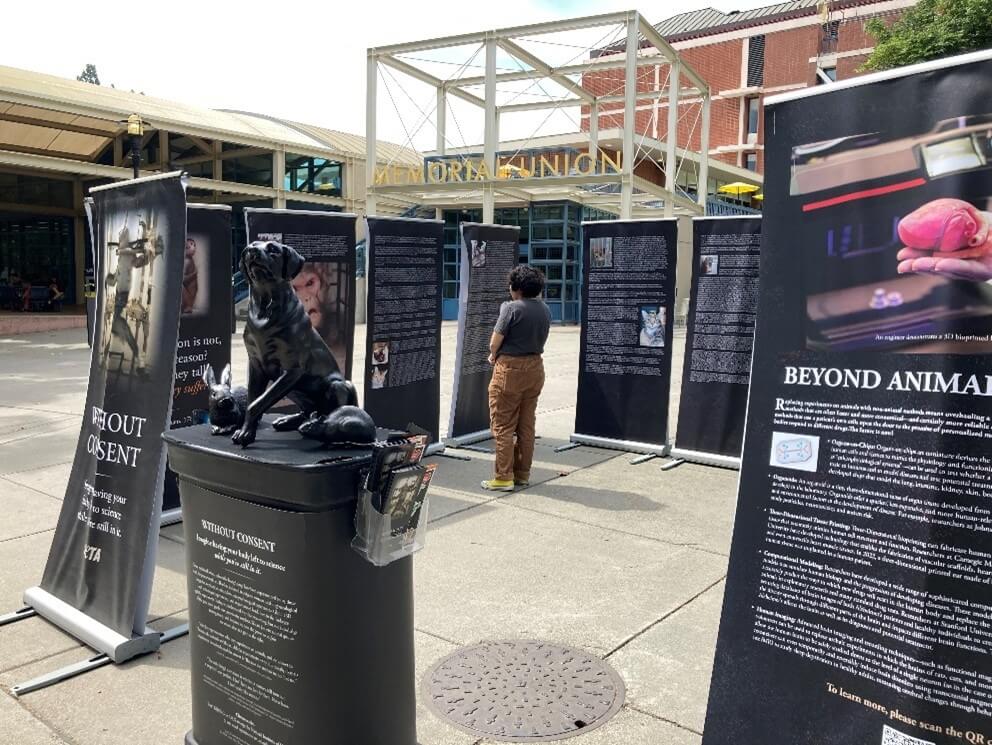Beginning on February 5, PETA will bring its eye-opening exhibit “Without Consent” to the University of Alabama at Birmingham (UAB) on one of the final stops of its national tour. The traveling exhibit explores the troubled history of experiments on animals and features almost 200 stories about animals used in these tests—including the seminal Silver Spring monkeys case, which launched PETA and led to the nation’s first arrest and criminal conviction of an animal experimenter for cruelty to animals. That experimenter, Edward Taub, has been at UAB since 1986—and while he may not be tormenting monkeys anymore, horrors continue at the university, home to a notorious, curiosity-driven xenotransplantation laboratory, in which experimenters cut organs out of animals and implant them in other species.
When: February 5 to 9, 12 noon to 4 p.m.
Where: Five Points South, at the intersection of 20th Street S. and 11th Avenue S., Birmingham
Modeled after the Vietnam Veterans Memorial, “Without Consent” will be on display locally for five days. It features 24 panels with descriptions and photographs of nearly 200 experiments on animals conducted at U.S. institutions from the 1920s through the present. Watch the trailer here. An interactive virtual exhibit is also available here.
“‘Without Consent’ tells the true stories of animals harmed and killed in experiments that they did not and could not consent to,” says PETA Senior Vice President Kathy Guillermo. “Humans are only one animal species among many. Having the power to exploit the others does not give us the right to do so.”
UAB has amassed an extensive rap sheet of federal animal welfare violations for offenses including carving into monkeys’ skulls without first seeking alternative methods, as required by law; squirting Woolite laundry detergent on a baboon’s open, hemorrhaging surgical wound; employing unqualified staff; and providing suffering animals with inadequate veterinary care. Experimenters at UAB have also forced ferrets to inhale cigarette smoke for months on end; infected hamsters with a virus that caused them to suffer from a variety of symptoms, including weight loss, lethargy, and diarrhea, before killing and dissecting them; and injected a substance deep into the spinal muscles of half a dozen cats, causing agonizing pain and hypersensitivity—without providing any pain relief.
“Without Consent” also makes the point that vulnerable humans—including orphans in tuberculosis and psychological experiments, immigrant women in gynecological surgeries, soldiers in LSD and poison gas tests, and impoverished Black men in syphilis experiments—were exploited in experiments. Just as society now understands that these experiments were wrong, “Without Consent” shows that we need to let a similar moral awakening guide our conduct today by extending consideration to other nonconsenting sentient beings.
PETA—whose motto reads, in part, that “animals are not ours to experiment on”—points out that Every Animal Is Someone and offers free Empathy Kits for people who need a lesson in kindness. For more information, please visit PETA.org or follow the group on X (formerly Twitter), Facebook, or Instagram.
The post PETA Exhibit Exposing History of Animal Tests Coming to University of Alabama at Birmingham appeared first on PETA.
This post was originally published on Animal Rights and Campaign News | PETA.
